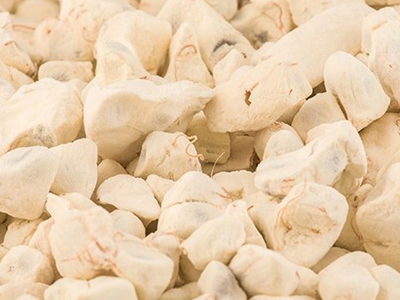Baobab
Afro Seeds
Nutritional Value
Baobab fruit is a source of vitamin C to strengthen the immune system, potassium to balance fluid levels within the body, calcium to build strong bones and teeth, vitamin A to maintain healthy organ functioning, and other nutrients, including iron, magnesium, and antioxidants. In traditional African medicines, Baobab fruit pulp is mixed with water and used to reduce fevers, diarrhea, and indigestion. The white flesh can also be chewed and applied topically to rashes or combined into a juice to soothe burns. In Africa, it is said that washing a baby boy in water infused with Baobab bark will bless the child to grow tall and strong like the tree.


Afro Seeds
Applications
Baobab fruits have a sweet, tangy, and refreshing taste suited for fresh and cooked preparations. The white, dry pulp can be consumed raw and should be separated from the small brown seeds. Consumers often comment that eating the seeds with the white pulp creates an unpleasant, unpalatable flavor, but they are both enjoyable separately. The white pulp can be extracted, ground into a fine powder, and mixed into sauces, salad dressings, yogurt, jams, and jellies as an added flavoring, The ground pulp can also be stirred into soups and stews, added to porridges, or used as a topping sprinkled over popcorn. In addition to savory preparations, Baobab fruit powder is popularly incorporated into baked goods such as cakes, muffins, and cookies or added to energy bars. The powder can also be stirred into smoothies, milkshakes, lemonade, tea, or other mixed beverages as a reprieve on a hot day. In Senegal, Baobab fruits are used in bouye juice, a drink made only from the fruits, or bissap, a drink of Baobab powder combined with dried hibiscus flowers, ginger, sugar, and water. Beyond the fruits, the young leaves of the tree can be eaten in salads, stir-fries, or crushed and made into a relish. The seeds from the fruit can also be roasted and consumed like a standard nut, grounded into a drink, or ground and used to thicken soups. In Africa, the Baobab flowers are consumed as another culinary ingredient, but be warned, in some African tribes, it is believed that Baobab flowers contain evil spirits. Picking a flower from the tree is rumored to bring bad luck and death by a lion attack. Baobab fruits pair well with vanilla, maple syrup, brown sugar, and fruits such as pineapple, mango, and berries. Whole, unopened Baobab fruits can keep for several weeks to several years, depending on the variety, quality, and storage environment.
